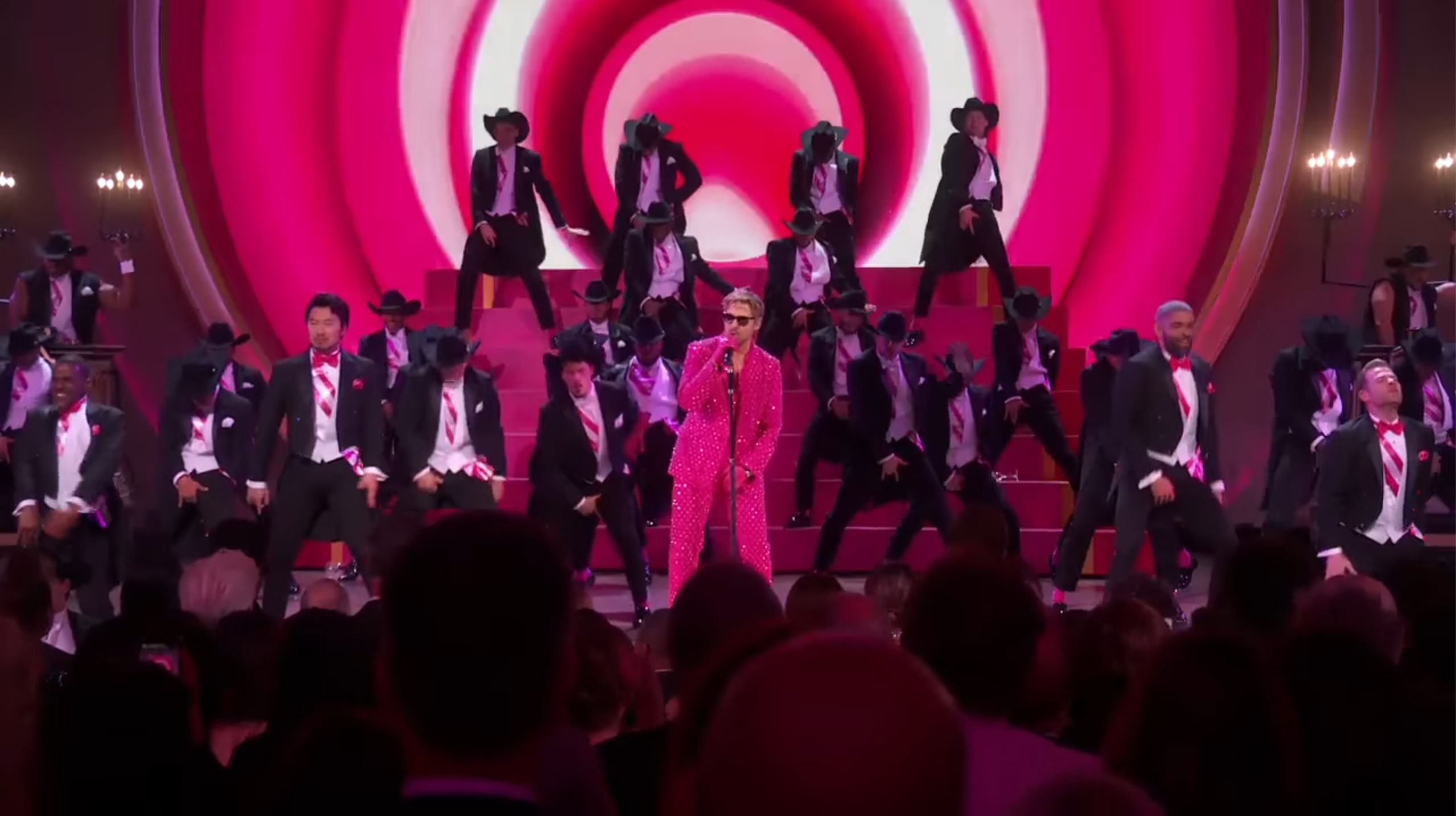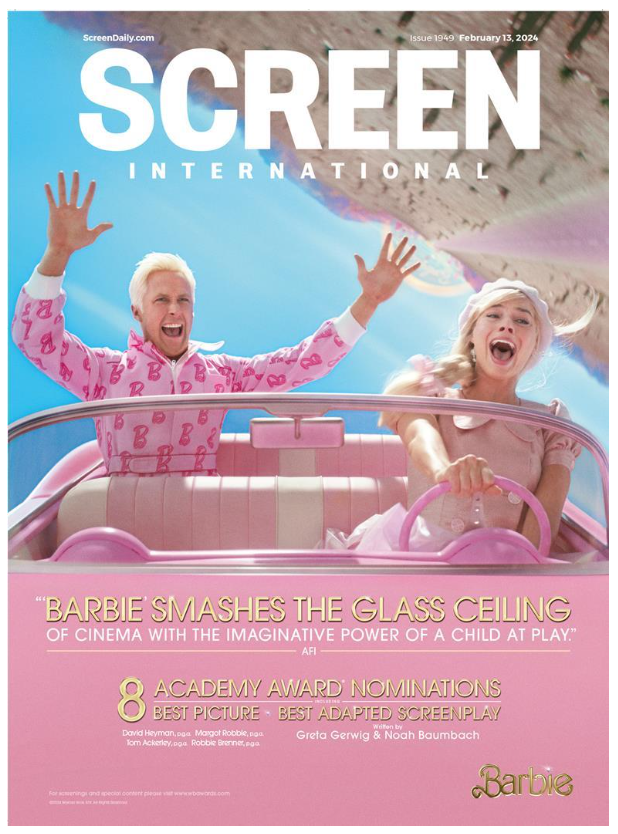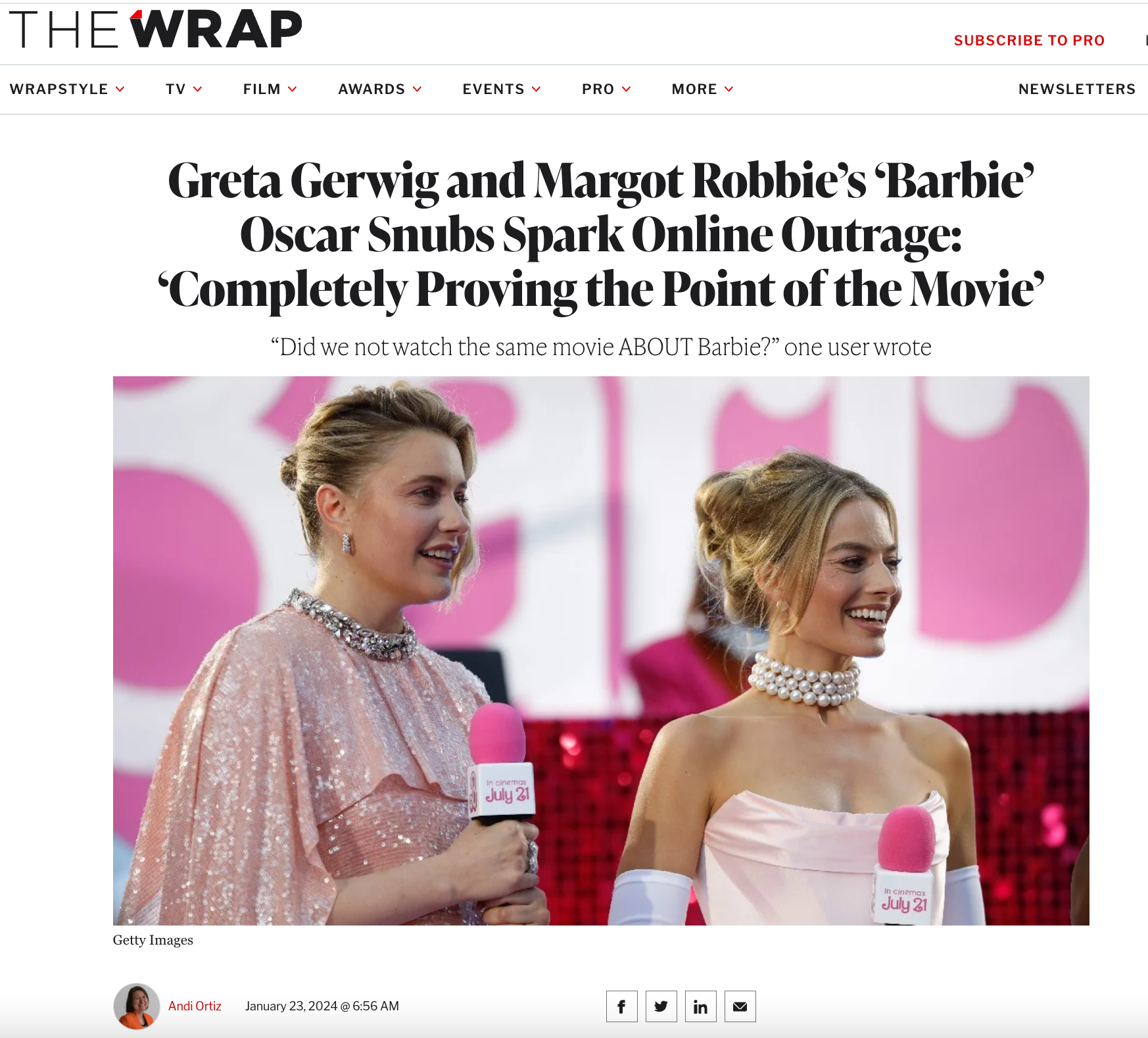Ryan Gosling Brings the Kenergy, Or Barbie’s Night Out at the Oscars
Courtney Brannon Donoghue / University of North Texas
After watching Ryan Gosling’s “I’m Just Ken” performance at the 2024 Academy Awards ceremony, I knew immediately I had to write about it. The musical performance itself was pure sugary confection for lovers of Greta Gerwig’s Barbie (2023), Hollywood musicals, cowboy hats, Mickey Mouse Club era Gosling, all things pink, electric guitars, and so much more. The opening shot begins with distant twinkling pink lights. The camera tilts down to Gosling hidden in the shadows of the Dolby Theatre audience amidst his fellow Barbie cast and creative collaborators. Tilting up a black cowboy hat to reveal that familiar face wearing sunglasses, Gosling’s Ken begins to sing the Oscar-nominated song into his microphone, at Margot Robbie’s Barbie sitting in front of him, and directly into the camera at the live home audience. I watched the clip at least a dozen more times and I still find earnest delight in each viewing (Like Gosling, I am a Xennial after all and we are nothing if not unabashedly earnest and enthusiastic).

Classical Hollywood film historians no doubt will offer a more nuanced take on Ken’s bejeweled pink suit and matching leather gloves as he dances alongside a chorus of tuxedoed Ken’s with pink sashes—a winking allusion to Marilyn Monroe’s iconic musical number “Diamonds Are A Girl’s Best Friend” in Gentlemen Prefer Blondes (1953, dir. Howard Hawks). A number of details reference Monroe’s scene, even something as small as a few background Kens holding candelabras. The Kenergy peaks during a Busby Berkeley-esque synchronized sequence. The camera cuts to a bird’s eye view of Gosling as a few Kens pick him up and twirl his relaxed, outstretched figure surrounded by more dancing Kens holding up giant cutouts of a vintage Barbie face. The spectacle and excess is truly a love letter to the Golden Age of Hollywood musicals as Ken pays homage to Hollywood’s most iconic blonde.

Barbie at the Oscars, on the one hand, offers a pink coated coda to my Flow column from November 2023. I’ve continued to have Barbie on the brain over the past six months as I’ve visited a number of college campuses across the U.S. meeting with undergraduates and giving talks on my new book The Value Gap: Female-Driven Films from Pitch to Premiere (UT Press, 2023). At every single campus, our conversation would inevitably turn to Barbie—the box office, critical reception, marketing campaign, Stereotypical White Barbie, America Ferrera’s monologue, Kenough sweatshirts, and later the Oscar nominations. Whether Film majors, Rhetoric and Media majors, or Women and Gender Studies majors, these students, like much of the general audience, were divided—is Barbie a feminist glitter grenade aiming to blow up the long history and privilege of the male-dominated studio blockbuster? OR does the centering of Ken whether within the narrative and music soundtrack or across the marketing and awards campaign only serve to reinforce the plastic political themes and white postfeminist investment of the entire venture?
Before the “I’m Just Ken” musical number was confirmed in the two weeks leading up to the Academy Awards ceremony, industry and popular debates circulated around the Barbie awards season campaign and eventual nominations. The “For Your Consideration” strategy fully embraced the film’s pink feminism with ads speaking to contemporary gender equity debates around female-driven filmmaking and leaning into Barbie “smashing the glass ceiling of cinema.” Most notably, the Warner Bros. awards site strategically included a recorded “sit down” conversation between Greta Gerwig, her co-writer/partner Noah Baumbach, and the writer/director Jane Campion. Campion herself is a groundbreaking feminist filmmaker and the first woman to win the Palme d’Or at the Cannes Film Festival and the third woman to win the Best Directing Oscar in 2022. The studio’s intended message was obvious that Gerwig belongs in the elite Oscar director club with Jane Campion, Kathryn Bigelow, and Chloé Zhao.
Barbie went on to be nominated for eight Oscars—Best Picture, Best Adapted Screenplay, Best Actor, Best Supporting Actress, Best Costume Design, Best Production Design, and two nods for Best Song. The Warner Bros. film only won a single statue for “What Was I Made For?” (music and lyrics by Billie Eilish and Finneas O’Connell). Debates had circulated for months around the so-called snub or lack of nominations for Greta Gerwig in the Director category and Margot Robbie in the Best Actress category. Folks inside and outside of academia often asked my opinion on Gerwig and Robbie’s snubs and if I think they deserved the directing and acting nominations, respectively. My first reaction is that 1) the awards seasons landscape is a complex one with many moving parts and sites of power, leverage, and value, aka box office does not necessarily translate to accolades in awards season, and 2) Oscar snub controversies are not new. Every year debates swirling around who is snubbed, who is a shoo-in, and who is the underdog represents a profitable news cycle leading up to the Academy Awards ceremony.
Both Robbie as a producer and Gerwig as screenwriter were nominated for these vitally important roles but arguably less publicly visible ones. Both Gosling and his co-star America Ferrera nominated in their respective acting categories released statements and spoke in interviews about their disappointment for the directing and best actress snubs for the two women who were the central creative forces behind taking Barbie out of her box. In a Time magazine cover story, Gerwig recalls a conversation with a friend’s mom who shared similar disappointment in which the filmmaker replied: “But I did. I got an Oscar nomination [for Best Screenplay].” It truly is a delicate line for the women involved in any big Oscar campaign to walk and for some reflected Ferrera’s infamous Barbie monologue that begins with “It is literally impossible to be a woman.” And yet, I would also point to notable snubbed creatives of color who did not get the same press attention during this awards season. For example, Greta Lee’s exquisitely heartbreaking performance in Celine Song’s Past Lives, Charles Melton’s quietly transformative role in Todd Haynes’ May December, or Ava DuVernay writing and directing Origin, the devastatingly beautiful adaptation of Isabel Wilkerson’s non-fiction book Caste: The Origins of Our Discontents. [1]

Sure, Barbie the billion dollar blockbuster had a massive industrial and cultural impact in 2023. And yes, many folks involved with the project, within the industry, or simply as movie fans were disappointed. However, I would argue we are asking the wrong questions. Instead, how does the way voting works in each chapter of the Academy, specifically the male-dominated directing chapter, disproportionally impact or marginalize not just white women but more so women of color? How has the membership demographics of each chapter changed over time, particularly since the mid-2010s pressure from #OscarsSoWhite #MeToo #TimesUp campaigns?[2] How has a push for more identity group and international inclusion among the members changed the organization in the short-term and the long-term, if at all? What can the Academy membership demographics and voting patterns tell us about Conglomerate Hollywood in the 21st century and ongoing questions about and pressure for more inclusive, diverse, and equitable employment practices, institutional cultures, and industry dynamics? And ultimately what does an Oscar win really mean for a film creative’s career status opportunities or a film company’s future? What kind of leverage, capital, and opportunities does this accolade afford and how does the unevenness impact marginalized creatives in front of and behind the camera differently than their white and/or male peers?

The power dynamics involved in Oscar campaigning and awards season in general, involving complicated formal/visible versus informal/invisible labor, offers a rich and complex site of study for media industry studies. Behind-closed doors individuals, films, and companies are backed by the resources, strategies, and active participation necessary to gain a nomination and then secure a win. And like most industry dynamics, cultures, and business practices in Hollywood, these accolades are both simultaneously symbolic and also reflect material inequitable practices in an industry that still remain largely white and male.
So hat tip to you, Ken Ryan Gosling, for giving Gerwig, Robbie, and Ferrera a spontaneous moment at the mic during your Oscar musical number to sing along—“I’m just Ken (and I’m enough) and I’m great at doing stuff.” Barbies everywhere thank you for their fleeting moment to shine.
Image Credits:
- Ryan Gosling’s “I’m Just Ken” Performance at the 2024 Academy Awards ceremony (Author’s screenshot)
- Ken swimming in a sea of Barbies during the Academy Awards performance (Author’s screenshot)
- Screen International cover featuring a Barbie awards season “For Your Consideration” ad. (Author’s screenshot from digital subscription)
- Trade coverage of Greta Gerwig and Margot Robbie’s Oscar “snub” (Author’s screenshot)
- Ryan Gosling sings “I’m Just Ken” at the 2024 Academy Awards
- DuVernay has spoken openly in interviews about her disappointment in the lack of Oscar recognition both Selma and Origin. See: https://variety.com/2023/film/awards/ava-duvernay-origins-snubbed-overlooked-awards-1235835147/; https://www.hollywoodreporter.com/movies/movie-news/ava-duvernay-origin-award-snubs-dave-chappelle-angelina-jolie-1235793298/. [↩]
- I have written about pressure points around #MeToo at awards ceremony as well as a failed promise of the Times Up movement in the The Value Gap. See Chapters 1 and 5. See also: Arcelia Gutiérrez, “Situating Representation As a Form of Erasure: #OscarsSoWhite, Black Twitter, and Latinx Twitter,” Television & New Media, 23:1 (September 2020); Isabel Molina-Guzmán, “Why Hollywood Remains ‘SoWhite’ and a Note on How to Change It,” The Myth of Colorblindness: Race and Ethnicity in American Cinema, eds. Sarah E. Turner & Sarah Nilsen (Palgrave, 2019); Angharad N. Valdivia, “#IntersectionalActivism: Tales of origin and intersectional negotiations,” Interactions: Studies in Communication & Culture, 10:3 (November 2019) pp. 159-168. [↩]